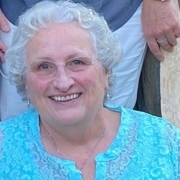CASA Volunteer Advocate Kathy Johnson’s Commitment to Caring
 Kathy Johnson has built a life on caring for others. During her career in nursing, she taught nursing students how to care for children with special needs. At home, she raised her four children, and is now a grandmother of 10 (not one to sit idle, Kathy crocheted a blanket for each grandchild last winter during the pandemic lockdown). So, it’s no surprise that after retiring in 2016, Kathy took on the role of CASA volunteer advocate. She had a coworker who was involved with CASA, and Kathy thought it sounded like the type of thing she would enjoy, and a good opportunity to give back to her community.
Kathy Johnson has built a life on caring for others. During her career in nursing, she taught nursing students how to care for children with special needs. At home, she raised her four children, and is now a grandmother of 10 (not one to sit idle, Kathy crocheted a blanket for each grandchild last winter during the pandemic lockdown). So, it’s no surprise that after retiring in 2016, Kathy took on the role of CASA volunteer advocate. She had a coworker who was involved with CASA, and Kathy thought it sounded like the type of thing she would enjoy, and a good opportunity to give back to her community.
Having now spent over five years as a CASA, advocating for close to 20 children, all of the cases stand out to her in some way. “I developed a pretty close relationship with a little girl on one of my cases. I looked forward to my visits with her probably as much as she did. She always sticks out in my mind, as well as her caregivers. It meant a lot to me. That case had a relatively good outcome for the child, and I felt good about it.”
Part of what has surprised Kathy the most during her time volunteering is the enormous demand. “There are just so many children at risk in this world today, even in rural New Hampshire.” As with many CASA advocates, the learning experience hasn’t ended there. “My long-ago idea of what a perfect family life is has changed a lot. But as I’ve gotten older I’ve realized that everybody has struggles, and there’s no shame in it. I’ve learned that it’s ok to ask, and people should ask, for help. Raising a family in the best of circumstances is challenging, and when you’re not in the best of circumstances it’s even more so.”
For Kathy, the most satisfying part of her work as a CASA is when she’s able to get kids to tell her what’s really important to them. “Kids are a lot like adults in that sometimes they hide their feelings. Maybe they really don’t want to go back with their parents, but they feel like they should say they do. So, to me it’s meaningful if I can really understand what that child is trying to tell me.”
For those considering volunteering, Kathy explains “It’s work, but not a lot of work—although there are certainly cases that require more time and attention than others. But it’s important to know that you can ask for help as a CASA and that CASA has a good support system. Anyone can do this work with some help and advice from others. And you really do feel like you make a difference.”
If you would like to become a CASA volunteer, consider attending an upcoming virtual information session to learn more, or submit an application today.


